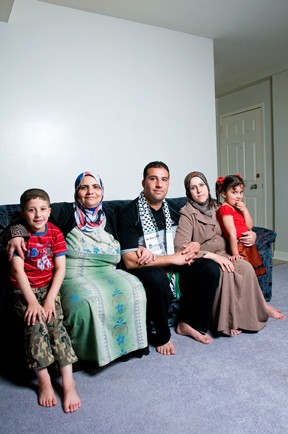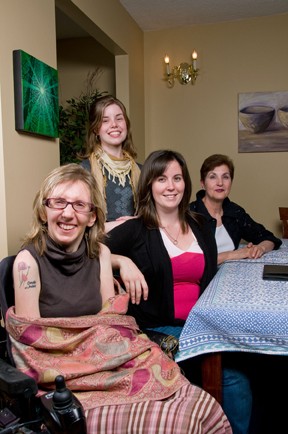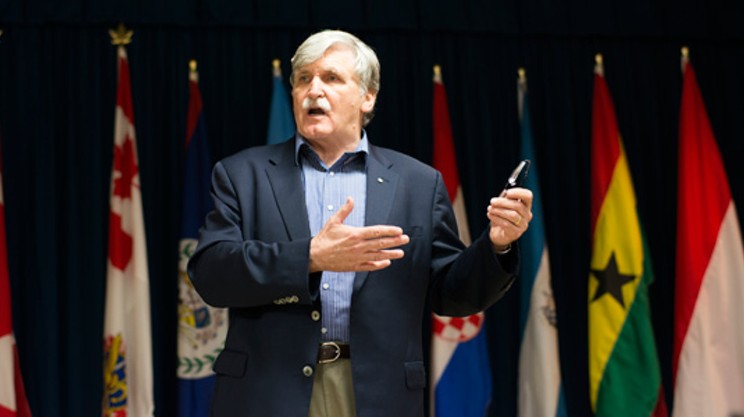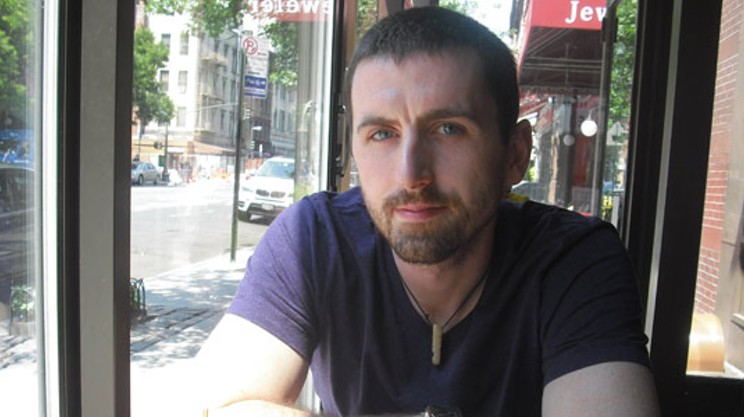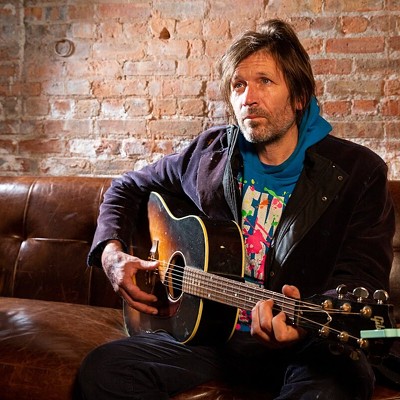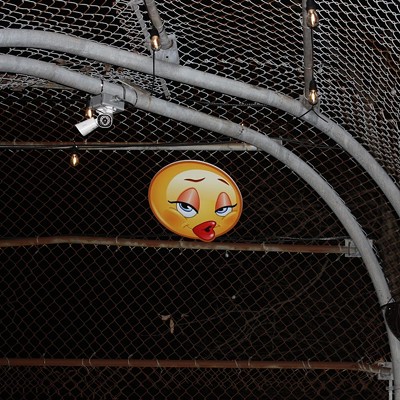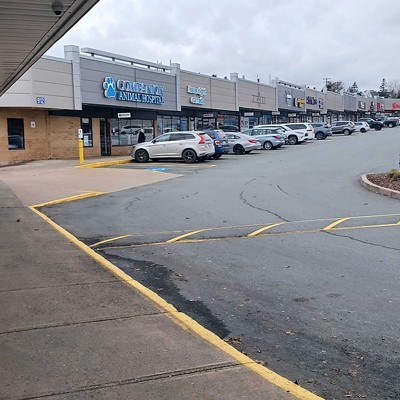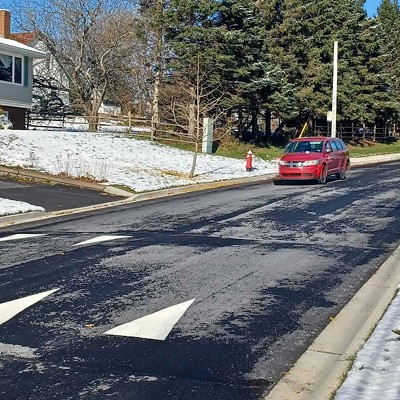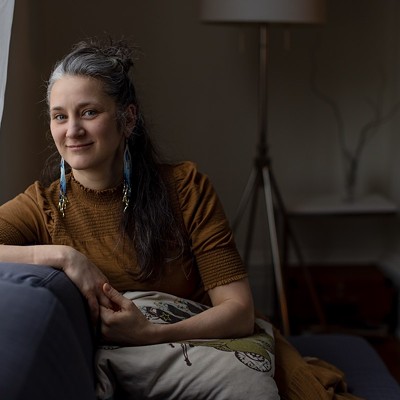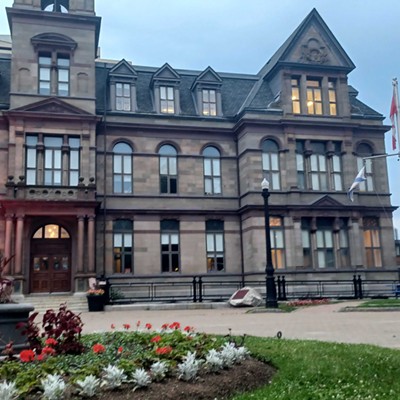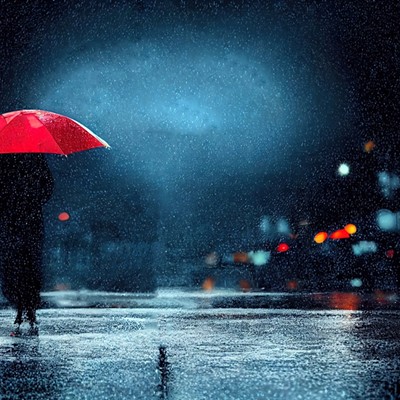There's one phrase you need to know to understand this story.
"No mushkila."
The "no" you've already got. It's English.
"Mushkila" ? That's Arabic for "problem."
No mushkila = no problem. And Yihya Naief says it all the time, because it's part English and part Arabic and quite funny. Just like Yihya, a 29-year-old Palestinian Iraqi, who might be your new neighbour.
When I get lost and make Yihya late for his English language class? "No mushkila!" When I bring the photographer over to shoot Yihya and his wife Areeg Abdalftah and their kids Reem (a girl who's four) and Amir (a boy of six) and the family is tripping on cords and being blinded by flashes? "No mushkila!"
When Amir is playing Super Mario on the computer in the family's Fairview apartment and he pretends he can't hear his dad telling him it's time to stop? "Mushkila," says Yihya, deadpan, pointing to Amir. "Mushkila."
But in the scope of problems this young family has faced? Too much Super Mario is really no mushkila at all.
Yihya and Areeg fled at dawn.
Teacups and bedclothes and photographs. Furniture, pots and plants---"probably everything we had is gone," says Areeg, through translator Hiba Khammash.
"We left like thieves."
Except the only thing Yihya and Areeg took when they fled their Baghdad home was clothes. Amir was just two; Reem, a four-month-old baby in Areeg's arms, bumping along Highway 11 toward the Syrian border. The road is Google street-view enabled, if you're interested in the scenery.
I suspect they weren't. The couple left in such a panic, Areeg didn't have the chance to say goodbye to her parents. She hasn't seen them since.
Not even out of Baghdad, soldiers stopped them.
"The only thing we were thinking," Yihya says: "She is going to see our papers and know we are Palestinians and she is going to kill us."
Later, they passed through Abu Ghraib, the city containing the notorious prison, a place they were warned anyone Palestinian or Sunni would be killed.
In the evening, they reached the Syrian border. In a sandstorm.
It was May 7, 2006. They slept on the streets of Al-Tanf for three days. The desert nights were freezing.
Then, the United Nations High Commissioner for Refugees moved them to the UNHCR refugee camp at Al-Hol.
Take a moment to consider this situation.
Leaving your home and your every possession. Leaving your parents and siblings and friends without telling them how much you love them. Travelling without protection in one of the most dangerous places in the world. Crossing a border without a passport. And doing it all with an infant and a toddler.
Some people don't like to go on vacation unless they can speak the language and get Bacon Double Cheeseburgers. Yihya and Areeg left everything.
"I was put in the situation," says Areeg. "I had to deal with it. It was tough, but we had to do it and we had to move on with our lives."
No mushkila.
It's Areeg's habit to serve guests to her home sweetened tea with sage.
She walks from the kitchen and sets a tray on a low table next to the blue sofa. She didn't bring much to Halifax from Syria, but she brought these tiny glass teacups with saucers.
Areeg wears the hijab---today, grey and black with vivid pink sandals. She is 25 and has been married since she was 17. She has a sweet smile and shares her husband's wit.
Saddam Hussein fell 20 days after their wedding. "We were engaged, and my mom was telling Yihya, 'Get on with it! Get married! There is going to be a war!' We got married," she says, "but the war happened anyway."
On Yihya and Areeg's living room walls, there's a plastic clock, fabric flowers and a Palestinian scarf. It's tidy. But there also isn't a ton of stuff to mess up, though the kids do their best---Amir tosses his Spider-Man backpack on the floor; Reem scurries in and out dropping dolls, or pulling puzzles from the TV console.
"This is a transitional period for us," says Yihya, "from the desert to something better. We look at our future and find something bright. We are so excited to change."
Yihya and Areeg are part of a 24-member extended family that came to Halifax from the Al-Hol camp as privately sponsored refugees.
Though she's not the technical matriarch (there's a 91-year-old grandmother on the scene, too), Yihya's mom Fatiyeh fills the role, popping in and out of the apartment, having tea, making jokes and peppering the conversation liberally with "Alhamdulillah" (roughly, thank god).
Fatiyeh and her husband Mohammad have eight children---besides Yihya, three more sons and their families are in Halifax, plus an unmarried daughter. Another son and two daughters are still in the Middle East.
Yihya and Areeg were the last of the family to arrive, in April. Four days later, it snowed.
"There wasn't any problem for us as Palestinians from the time the war had begun in 2003. Then, in 2006," says Yihya, "there was a bombing."
The blast happened February 22, at the Shiite holy shrine in Samarra. No group has claimed responsibility, but violence against Sunni Muslims and Palestinians soared in the aftermath.
Mushkila.
"We knew we had to leave," says Areeg. "Because they were coming into the houses, taking the men, and..." she stops.
Yihya doesn't. "They would take them and torture them and then kill them."
He calls me to the computer.
Yihya shows me photos of Baladiyat. It's in the eastern district of Baghdad, a Palestinian enclave. He shows me blown-up buildings, walls pounced by bullet holes.
"We couldn't go out and work and we had kids to feed," Yihya says. "We were squeezed in this area, no going out."
He opens the Internet browser.
"There are some pictures that are very hard to see."
I nod.
"These are disgusting photos. I am afraid you will be afraid of them."
Before: their neighbour, a barber. After: Taken from his shop, tortured and killed.
Before: another neighbour. After: "Do you know the liquid in a car's battery? Acid? They poured it on him."
Before: a family of five. After: shot to death in their car.
"My dad went to Syria because he had been threatened," Areeg says, quietly. "My mom and sister and brother are still in Iraq, but they can't leave the house."
The UN estimates that before May 2006---the month Yihya and Areeg left, at the height of the violence---there were 34,000 Palestinians in Iraq, most in Baghdad; 15,000 remain.
So now you know why Yihya and Areeg took their chances and fled.
But they never figured they would be stuck in the desert for four years.
Early on at Al-Hol, they couldn't sleep. "We had to keep waking to keep the tent up," Yihya says. "I had to hold it up at night so the tent wouldn't fall on the children."
There was enough food, but water was scarce and often contaminated. There were snakes, scorpions and insects they had never seen before.
Two years into their stay at Al-Hol, an electrical fire spread through 50 tents. "There was a pregnant woman in one of the tents," says Yihya. "She died."
It was 2008. That year, there were nine UNHCR-registered refugee camps in Syria alone, sheltering 125,000 Palestinian men, women and children.
They couldn't know it at the time, but the family still had another two years to go at the camp.
Yihya and Areeg's McFatridge Drive apartment in Fairview seems like the culmination of a long journey, a destination they didn't know they were looking for until they walked through the door.
But in a way, the challenges are only just getting going.
Areeg stands with her rambunctious four-year-old at the main branch library on Spring Garden Road. Yihya is at his English class at Immigrant Settlement and Integration Services (ISIS) in the West End Mall and Amir is in a grade one class at Fairview's Burton Ettinger Elementary, though at home I have never heard him speak a word of English.
Reem's in a mood. The kind by which four-year-olds are often afflicted. She's grabby, jumpy and clingy; her poofy green hair barrettes match her disposition.
Areeg is in jeans and ballet flats, with a lilac-coloured abbaya (a full-length dress), and pink headscarf. She is here to get a library card.
And though a volunteer interpreter is with her, Areeg is determined to get this done on her own.
"Apartment number?"
"Four, zero, four..." She stops. She thinks. This is the phone number.
"Apartment number?"
"Ahh...three, three."
Card in hand, Areeg has a quick look at some Arabic-language women's magazines. She knows the models on the cover, from Syria.
Downstairs, Reem finds Arabic children's books, but she's more interested in Hey Arnold!, Dora and Spider-Man DVDs. The interpreter explains DVD loans to Areeg: one week, a dollar a day if you're late.
"No mushkila."
Next stop? Learn how to use the Bank of Montreal ATM.
But first we sit on a bench outside the library. It's a sunny day. "What surprises me is the way the ladies dress," says Areeg.
"In Iraq, Saddam was strict. Any woman who was wearing short stuff, they would take her away. Everything was forbidden: no satellites for the TVs, nothing. So the first exposure we got was when we went to Syria. We saw women wearing pants and t-shirts. We weren't used to that. And now we have come here and women are wearing short shorts!"
Areeg started wearing the hijab when she was 10. "At the beginning, I only wore it in front of my parents; when I went out I would always take it off. Then I started to wear it all the time."
I look at Reem and wonder when she'll wear the hijab. Or, perhaps, if she will.
Because Reem will be a Canadian in ways Areeg and Yihya could never be, simply because she has come here so young. In six years, or 10, Reem could be anyone.
But for that matter, so could Areeg.
She is, after all, only 25.
She might get a paying job, she says, which she didn't have in Iraq; she might go to university.
"But the most important thing now is to learn English."
I'm giving Yihya a lift to his English class at ISIS. Normally he takes the bus.
"Fantastic!" he says in English. "Fantastic---[we] used to say [it] in Iraq."
There's more.
"Bicycle! Mug! Coffee! Coffee mug! Car back light!" I move a racket so he can sit down. He points. "Tennis! Arabic, English---same. Tennis!"
When we get to ISIS (late, so I earn more of Yihya's smiling, joking English: "I think I know better than you!") teacher Carly Sorensen is corralling students. Her class is small today---two women from Nepal who have been in Halifax for 11 months and an Ethiopian woman who's nearing two years in the city. Usually there are nine. Areeg takes classes five mornings a week with a different group.
Yihya finds his binder. His first job is to write the full date and the weather.
"Weather words are something we teach them immediately," says Sorensen. "And the alphabet and family words."
Yihya comes to ISIS for English classes four afternoons a week. He doesn't have homework, but he studies on his days off anyway, which he tells Sorensen.
"No break?" she asks.
"Good?" says Yihya, smiling expectantly.
"Yes. Good. Full-time English. English job," says Sorensen, leaving out the articles and verbs so he'll better understand.
At ISIS, Yihya says, "They make me feel confident and comfortable. So it doesn't feel too hard. Even though I don't know [English], I know I can learn, so I feel happy about that."
The rest of the class goes on break. But Yihya heads to the board to practise writing numerals, zero to 12.
"He is obsessing with the numbers," whispers Sorensen, who's come to the back of the room to chat.
"How long this program is on depends on funding," she says. "How long Yihya is able to stay depends on how he learns."
And how well he succeeds in Halifax do-or-die depends on learning enough English to get a job. Even then, says ISIS's communications, research and development manager Nabiha Atallah, "there are people who come with certain kinds of experience who will not find work here."
In Baghdad, Yihya worked as a painter and electrical technician. "I am willing to work tomorrow," he says, "but language is a problem."
And, in a way, Yihya's only got until April to solve it.
"Everybody deserves a home," says Liz MacBeth, of Friends for Refugees. And it's that simple. That's the entire rationale behind four friends putting $26,000 on the line to bring a family of strangers to Halifax from a camp in the desert 8,000 kilometres away.
Seriously. That's it. Linda Santoloce, Rachel Millet, Jennifer Powley and Liz MacBeth got to talking and realized: shit, we can totally do this. We can do more than donate $100 to some charity and pat ourselves on the back. We can whip up some help and raise some cash and bring a refugee family to Halifax. We can do this.
And they did.
I don't want to get preachy here, but, really, if they did it---and they are doing it right now---then you could probably do it, too
No mushkila.
The $26,000 figure is set out by Citizenship and Immigration Canada, supposedly enough to establish and support a family of four for one year. In Yihya and Areeg's case, that's April 2010 to April 2011. The amount roughly matches social assistance. Friends for Refugees has fundraised the cash through events like yard sales, benefit concerts and animation screenings, and through online donations at friendsforrefugees.com.
This is uncommon, anonymous private sponsorship.
About 2,500 immigrants settle in Nova Scotia each year. Of those, about 200 are government-sponsored refugees. And only about 20 are sponsored privately, and usually by family members, not complete strangers.
Evelyn Jones, ISIS's refugee sponsorship co-ordinator, is trying to change that. She's investigated private sponsorship in Manitoba, which has a population similar to Nova Scotia's but which brings in close to 1,000 privately sponsored immigrants a year.
"We need new people to be doing this. But they don't even know how they can." It's Jones' job to show Nova Scotians it's do-able.
On top of money, private sponsors also commit to a year of integration support--- things like helping the family set up a budget, decipher the bus schedule, register kids for school and adults in English classes. They help them learn to sort garbage and clarify, for instance, what a library is. "They may assume you have to pay [to borrow books] and they may not go," Jones explains. These details can have a whopping cumulative affect on how well families adjust to their new lives.
Sponsors also offer friendship.
"Some people have been in a camp for years," says Jones. "Their life has been on hold. Other people have fled really quickly with nothing. Others have had to flee without saying goodbye. All of those kinds of things have a big psychological impact."
Between 1990 and 2006, Canada accepted 3.9 million immigrants---more per capita than any other country. Australia overtook us briefly last year, but we continue to lead the world as landing spot. That's for applicants who apply overseas through the right channels and are accepted, for refugee claimants who arrive on Canadian soil unannounced and make refugee claims (like the people aboard the Tamil boat that landed on the west coast in August), or so-called "convention" refugees like Yihya and Areeg who are certified by the HNHCR and who get here through government or private sponsorship.
Not everyone is happy about this.
Martin Collacott, a former Canadian ambassador in Asia and the Middle East, who researches and writes on Canadian immigration as a senior fellow with the Fraser Institute, lists the common arguments for high immigration levels: "Our populations are getting older, we have fewer babies, we are going to have a larger proportion of people over 65, and you need a lot of immigrants to provide enough workforce to pay the taxes and to pay social welfare and medical for the retired people.
"But all the research shows immigration has almost no impact on the average age of Canadians, because immigrants get older just like everyone else."
And in the Maritimes, Collacott says, "where population is stagnant or even facing decline, you can bring in immigrants but if there aren't good economic opportunities to keep the locals there, you really aren't going to get immigrants to stay either."
Nova Scotia, as it happens, was the only province to post a drop in population in the first third of 2010.
But what about refugees? What about newcomers we welcome on humanitarian grounds, not because of what they'll contribute in tax dollars? Collacott knows people need help, but he has reservations about the number of UNHCR refugees Canada accepts.
"We want to take the most vulnerable," Collacott says. "And that sounds very noble in principle, but sometimes some of the most vulnerable simply aren't capable of coping."
Yihya and Areeg were some of those most vulnerable refugees---officially stateless, lacking passports, subject to persecution from militants and the government alike.
How well will they cope? How well will they integrate?
"We are learning," she says. "The kids are learning. We have a future now. I'm happy."
"We feel welcome," adds Yihya. But then he speaks directly to Areeg. She starts nodding. Then laughing.
"The only thing is the bus driver," Yihya says. "All the bus drivers have been friendly to us but one. I see him every day when I go to ISIS and he doesn't say 'hi' when I say 'hi' to him."
Now they are both laughing. The bus driver won't say hi. This is the problem?
No mushkila, I'm sure.
Lezlie Lowe is a freelance writer in Halifax who's learning to better navigate Fairview. She gives special thanks to Hiba Khammash, without whose patience in translating not only Arabic to English and back again, but also the nuances of Islam, this story simply could not have been done.

